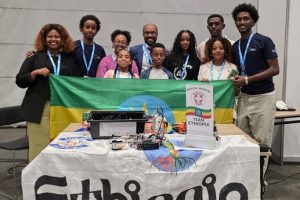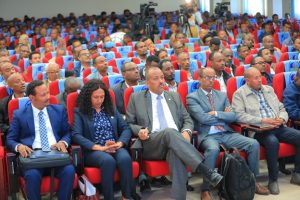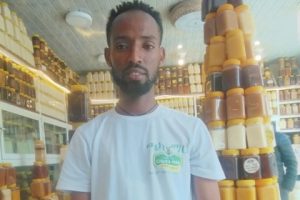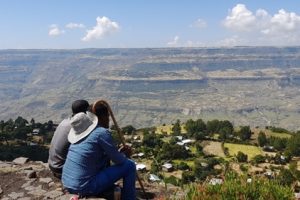
Most countries have their own heroes they see as the reformist founding fathers of the country. Individuals that belong to this category come to the scene one in a million as they give priority for their people rather than leading a comfortable life that could delight them.
Here in Ethiopia, we have few people that have written history with a golden ink. Today’s guest is one such founding fathers and pioneer of the ongoing change in the country. He is Activist, Human Right Campaigner and Political Analyst Jawar Mohammed.
Jawar was born on 12 May 1986 at small town called Dumuga (Dhummugaa) which is found on the border of Arsi Zone and Hararge. He was born to destitute parents. His father belonged to the Muslim faith,while his mother to a Christian one.
Due to this, his parents were seen by residents of the locality a showcase of inter-religious marriage. Since he was born and brought up in a family from the two big faiths , he developed a liberal and rational perspective towards any ideology and religion. He has a firm belief in equality and democracy. According to Jawar, everyone has a right to express his/her feelings and outlooks without harboring fear.
Starting from his childhood Jawar joined the outshining and clever students’ category . After completing school leaving exam with a high score, he got a chance to attend his college education in Singapore. In 2005, he moved to United States of America. He earned his MA in political science from Stanford University and earned his BA from Columbia University. In addition, he attended a semester at the prestigious university of Oxford.
Jawar is the founder of the Oromo Youth Organization. He mobilized and organized the Oromo youth all around the world using different social media outlets and holding different meetings in different countries. He is specially known for his mobilization of Oromo youths known as Qeeroo.
Jawar is the founder and director of the Oromia Media Network (OMN), the most influential media in disseminating news allover the world. He was exposing about the brutal system in the country. Jawar is the pride for the Oromo people as well as the country. He is considered by many as one of the most dynamic, energetic and influential politicians of the twenty first century.
He is married. The Ethiopian Herald had a moment of togetherness with Jawar.
Herald: Do you believe in federalism?
Jawar: It is not a matter of belief, it is more of a reality. A country like Ethiopia made up of multiple ethnic groups and built through violence has no other option. Federalism is a way of accommodating diverse views and diverse ethnic interests. In general, to keep Ethiopia together we do not have other options except federalism. We have to be able to devolve power and allow ethnic groups to rule their own homeland.
Herald: How do you assess the rule of law in Ethiopia these days?
Jawar: I heard that people took punitive measures brushing aside the rule of law. Taking the law into one’s hand is a misguided act. In dictatorship, when a rule of gun reigns supreme,intimidated, people obey the government . They fear armed people and the police. In democracy, people obey the government because they respect the law.
If we want people to respect the law, they should have understanding of the law. They must be allowed to participate in the making of the law. Here, people make law by electing their representatives. That is why we call them law makers. In the absence of elected people representatives, it is hard to find people who obey the law. I believe the law of the land in Ethiopia was imposed on the people. So, we cannot say there is a rule of law as we are in transition.
The aforementioned problem seen in Ethiopia has fermented out of violence, anarchism and rallies in different parts of the country. It is not unnatural because we are in a transition. People held at a gun point are outgrowing intimidation to embrace the respect of the law. The law has not really been made yet. We have to appeal to different common values to make sure violence never breakouts. Our primary objective has to be ensuring a democratic election.
When these people elect their representatives and when their representatives represent the people in the house of people representatives and make a law, people will start to say this law is mine because I was consulted and I should respect and obey it. Until we do that, we can’t really talk about the rule of law. It is very important to distinguish this.
Without democracy, and an elected government through fair and democratic election we cannot ensure a rule of law in the country. We say there is a Rule of law when people consult the law, respect it and obey the government. Right now, we don’t have a government that threatens people with guns, because we have beaten it on the street.
Now we are in transition and many violences are arising.This is the characteristic feature of a transitional process. The government should focus on how to solve the problems prioritizing objectives. In addition, the government should sit down with opposition parties on how to create common grounds.
Herald: What is the main problem of Ethiopian Federalism?
Jawar: Federalism leans on the demand of the people . Federalism has to respond to the people on the top or any level.Federalism is the result of different resistances. Federalism takes two things; structural devolution of the state as well as the question of wealth power. So, the formation of federal states fulfills one requirement of federalism, which is the structural devolution. It has to go with the power wealth and redistribution of power and wealth. In Ethiopia many ethnic groups are given power to administer their homeland. Structurally, they are empowered, but they are striped of power and wealth.
Power gets concentrated and centralized only in the hands of the dominant groups. In other words, ethnic groups are entitled ownership but practically they are not benefiting from it. By its nature federalism has no problem. The problem here lies in the way EPRDF implemented it .The approach was a wrong-headed one. The structure devolves power in the country, but fails to democratize it. Also,the relation between the states was limited. They had direct relation only with the federal government.
This is one underlying factor for the current crisis. There was no market place for politics except it was always vertical not horizontal. But now, states are starting to democratize and exercise power. So, in general, the problem of the Ethiopian federalism is lack of implementation.
Herald: In the face of challenges and ups and downs you never give up, from where do you get the perseverance?
Jawar: Well, I grew up in one of the most pauper communities, which suffered strifes. People there were extremely marginalized and prosecuted by the government. I felt I have to defend my people. Second, the enormity of the brutality that was taking place in this country made me to work more for people. In addition, the support I enjoyed from different youths world over afforded me stamina to accomplish my mission of defending my people.
Herald: Most people refer to you the man who thwarted the government’s structure single handed, what do say about this?
Jawar: I must not be seen one-man army. I have the largest army in this country because I am working with the Qeerroos that total from twenty million to thirty million. I have the largest social movement in the country .We are serving six thousand five hundred villages, hundreds of districts, cities , school children, physicians, engineers, solders,among others. I am working with millions.
I think it was the mistake of the government. They mistook me for a man who makes a frantic bid alone. We are engaged in grass root activism and tasks. We rally mobilization in different towns with social media activism. So, we utilized the modern social media to the required movement. I think the government was not clear how the modern mobilization worked. It was the army of millions.
Herald: What do you think about the crack down the government is taking on former high military and security officials alleged of thievery and human rights violation?
Jawar: Definitely I support the action. Because it is necessary and I support it for multiple reasons. One, these people looted the meager wealth of the country,which needs to get all support to break away from poverty. This is not only corruption it is a major felony. They bankrupted the country, state and government. They were supposed to relentlessly see to the completion of several mega projects like hydro power dam and sugar factories. These projects were key for the survival of one country,which enunciated it will join the ranks of middle income countries. They robbed the country’s chance of developing.
Going through legal procedures the convicted should be punished in order others draw lessons. But, I think the way they are being handled has some problems. Though, we have enough information about the crimes they had perpetrated, these guys are innocent until the court convicts them guilty. The government has to be careful not to persecute them leaning on mob justice.
They need to be prosecuted by the book. The house needs to establish an independent prosecution team and the process has to be transparent and fair. But the investigation needs to ripple to various companies within the federal government and states. I think the government is not mainly accusing suspects because they had committed crime and involved in corruption. The government sees the unrepentant as a threat for the ongoing change.The reformed government is fighting against sabotages. In general, on whatever counts they are being accused, it is a good thing for the country.
Herald: What do you recommend should be done to combat corruption and breaches of laws?
Jawar: I think the main problem is with our institutions. Our judiciary system should be independent; the anticorruption commission should beef up muscles to fight corruption. In this country everything was dependent on EPRDF. How could we expect judges appointed and controlled by EPRDF to prosecute EPRDF. How could we expect the anti-corruption commission, established and led by EPRDF members, to fight corruption and accuse the party.
If we want to fight corruption, we have to have strong institutions and vibrant Media outlets that serve the people and allow voice to the voiceless. If we do not really do that we cannot fight corruption. In addition, anti-corruption commission, judiciary arm, media, and citizen should work together to combat corruption. The government cannot arrest corruption alone.
Herald: Given the political situation in the country, few say that the 2012 election should be postponed, what is your take on this?
Jawar: The election must be conducted as per the slated time. The ruling party should hold discussions with opposition parties. Without election we cannot make our federal system functional. We cannot lapse back to dictatorship. Anyone who attempts to hijack the election or tries to impose his/ her ideologies on citizens is going to destroy the country. Everyone should get ready for the election that could spur the country’s march forward .
Herald: Though some do not agree, we are hearing the blame that TPLF/EPRDF ( the government before reform) is ascribable to the disagreements and racist acts among citizens , what do think on this?
Jawar: Everyone could do that as TPLF has done lots of mistakes. But Ethiopia’s problem is not started during the TPLF time. It goes back to the formation of the state. It accommodated many things. The problems could not be wholly attributable to PM Meles. TPLF had also created a floodgate of opportunities for the country. But some irresponsible individuals amid them made us lose golden opportunities created. Because, they swapped the domination of others with that of their own. Such acts fomented mistrust among ethnic groups.
Though, the problem was started during the emperor regime, TPLF takes the lion’s share in the destruction that surfaced here and there the past years. Because most offices, intelligence and bureau were controlled by TPLF. Sister parties could not evade the blame. Though sister parties are overhauling and changing themselves, TPLF has opted to maintain its former posture. This is the main problem that made TPLF more susceptible to blame.
Herald: Though Qeeroo has done a great thing and has a lion share for the ongoing change some say, it is not enjoying the praise it deserves. What do you think the reason for this?
Jawar: This was what happened the past few years. I think people are sending to the back of their memory who fought the system the past four years. I think people fear Keross are going to take a larger position. Here, the point is not on who did most. Instead, let us work on how to keep the change forward and allow the country experience leap on every sphere.
Herald: what do you think about the debate on Finfine (Addis Ababa)?
Jawar: I don’t think that it is possible and necessary to separate Finfine from Oromia legally and practically. The issue of Finfine needs to be addressed considering the rights of residents as well as the Oromia State. I believe it is the capital city of Oromia and the Federal State. Oromia should exercise certain power, because the activities of Finfine affects Oromia and its surrounding environs. In addition, it is the city of all nation and nationalities. We have to pay attention to their interests. We shouldn’t be very radical about it.
Finfine cannot grow if it is always locked in conflicts and tensions with the surrounding community. I do not think this as a serious matter, It is few people who are politicizing it. This is what the city council and the state sit down and negotiate on how to share power and resource. Then the city can grow fast. Otherwise both the city the state would be hurt. We have to be careful and pragmatic when we negotiate and advocate. We have to find middle ground for all.
The Ethiopian Herald, November 25/2018
BY AMBO MEKASA





